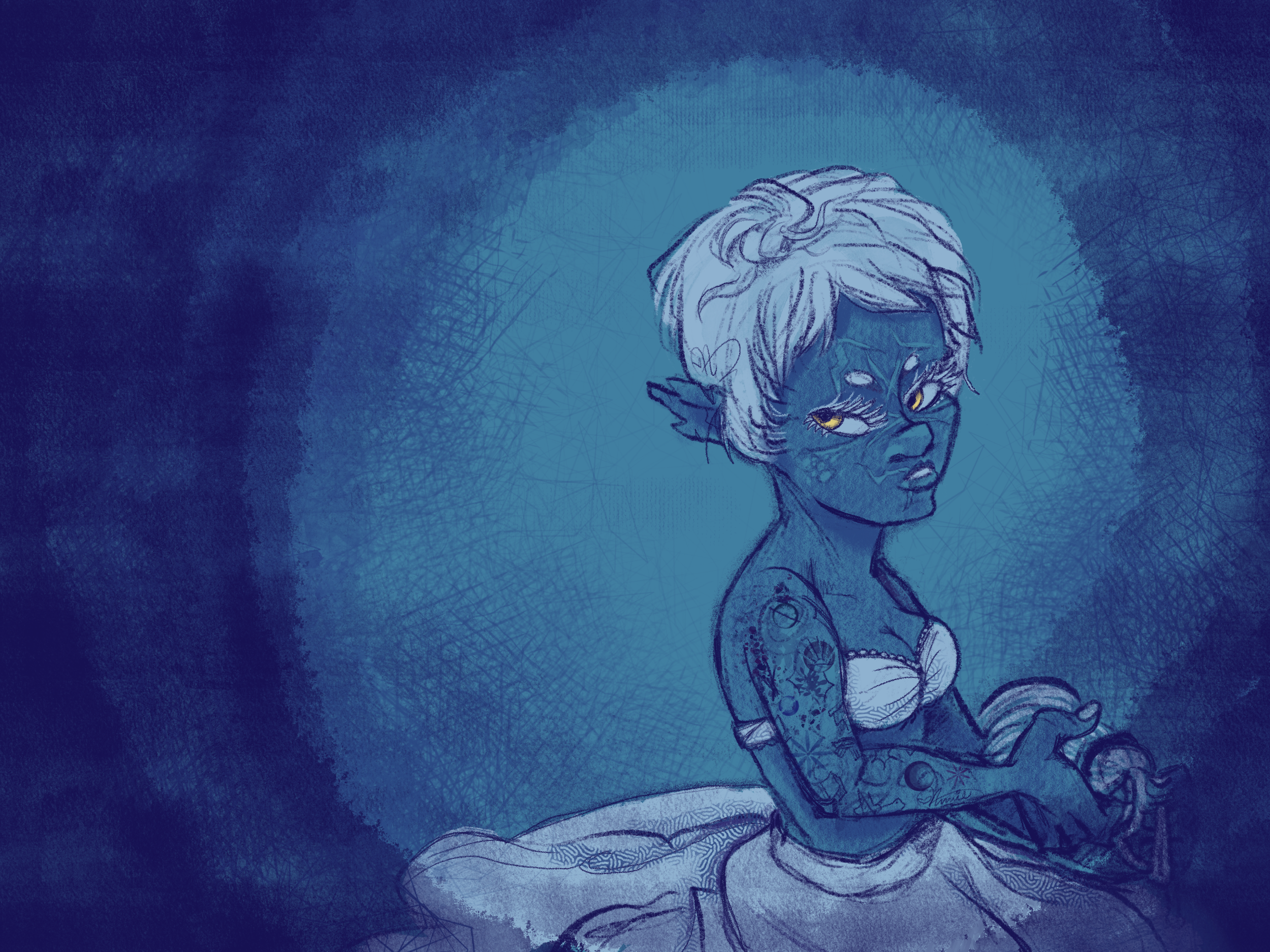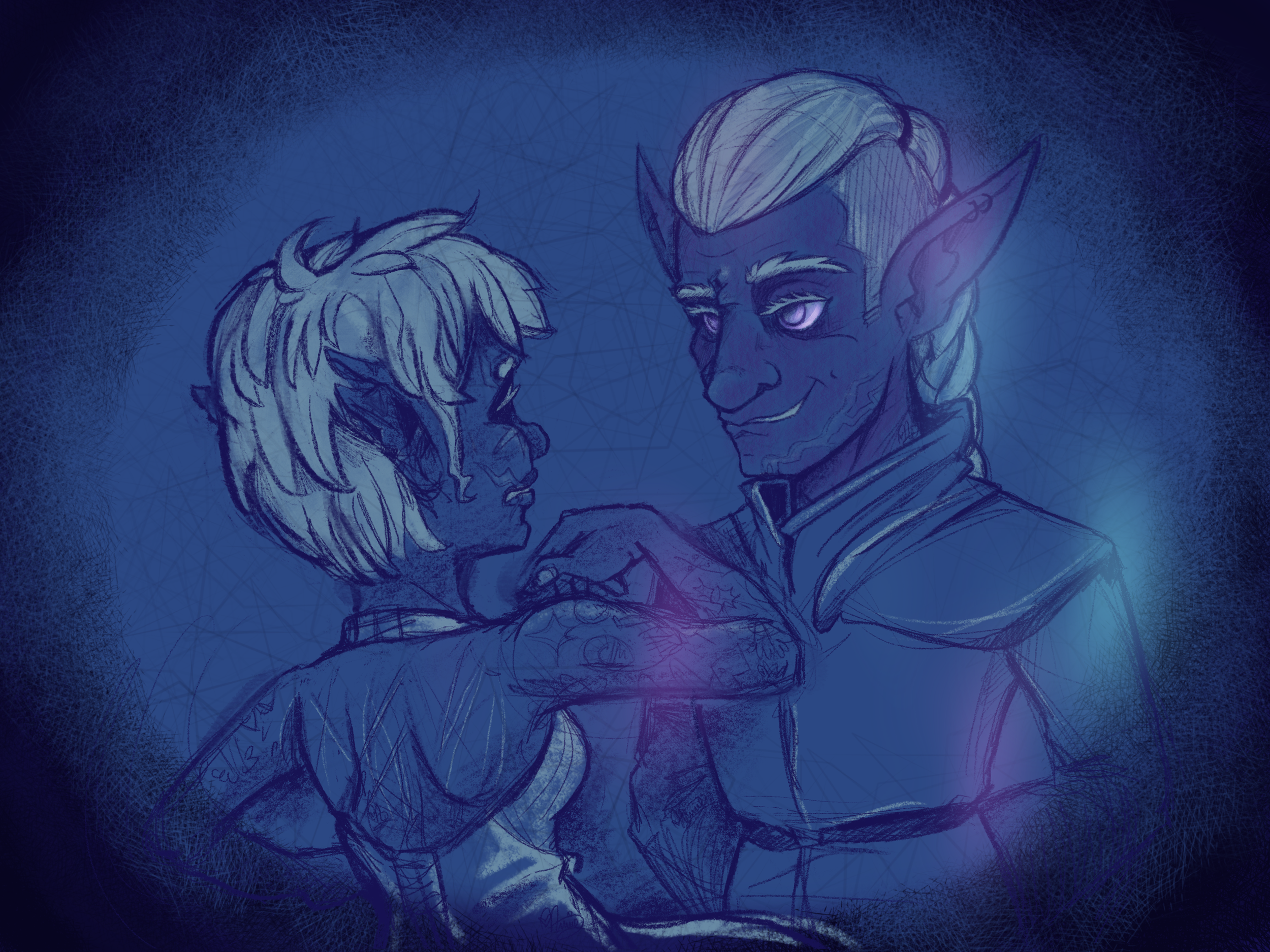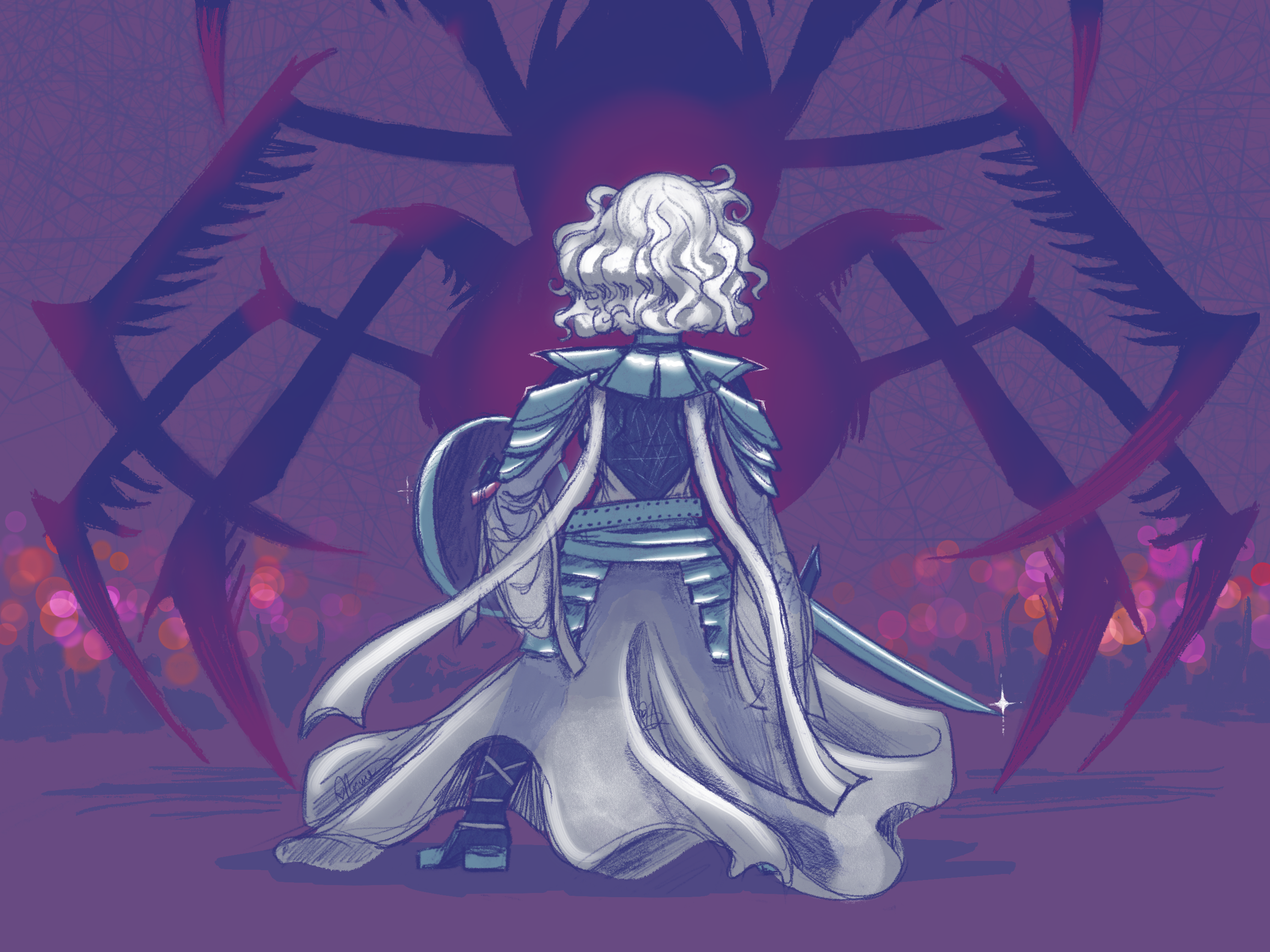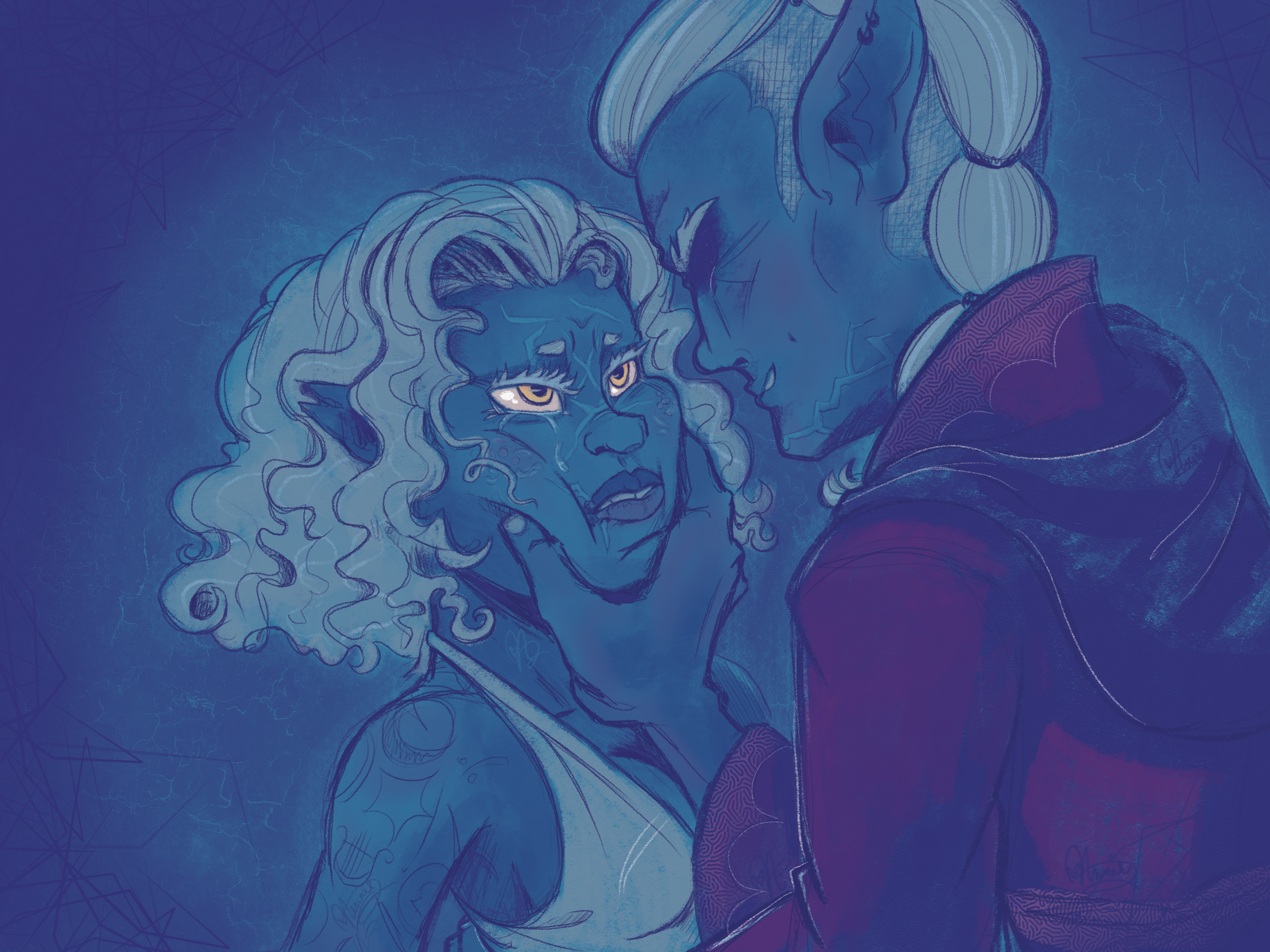Part 1: His Name was Temenos
— Part 1 —
The dungeon-bedroom was cold, as it always was. Stone walls wept with condensation, and iron sconces along the corners gave off a dim, bluish flame that cast long shadows and never flickered. At the center of the room sat a raised mat—her only real comfort. Not quite a bed, but softer than the stone, elevated just enough to remind her she was still separate. Sacred. Claimed.
The young svirfneblin woman sat with her legs tucked beneath her, the hem of her white skirt fanned neatly across her lap. The simple cotton undergarment across her chest itched at the seams but did its job supporting her full growth. Her alabaster-white hair, once longer and now chopped short into a pixie cut, framed the high cheekbones and tired hazel-gold eyes she had inherited from no one she remembered. In her hands, she toyed with a soft, fraying cord—braiding it into a tassel. Something to do. Something that was hers, if only barely.
Three raps at the door. Gentle. Polite.
Not one of the matrons. Definitely not the Overseer.
She did not move. “You may enter.”
The door creaked open.
He was unfamiliar. A male svirfneblin—young, perhaps only a decade or so older than her. His skin was blue-grey like storm-swept slate, smooth with youth but touched by the pressure of duty. He wore a pale grey robe belted with a single red woven sash. The robes of an Initiate.
He smiled as he entered, lowering his head slightly. “Lady Light.”
The svirfneblin woman blinked. She set the tassel down beside her. “…Good evening.”
“I hope it has been a good evening.” His voice was smooth, warm even, like he thought kindness could make up for whatever role he was here to play. “Was supper to your liking tonight? The stewed roots were gathered fresh from the upper tunnels. And… your scars—how are they healing?”
She nodded. “Healing fine.” Her voice was even, practiced. “The stew was soft. Thank you.”
He offered another smile, warm and polished. He knelt a few paces from her mat. “We’ve all heard of your endurance. How you’ve withstood every trial the gods have asked of you. The Overseer speaks highly of your fortitude.”
She didn’t answer that. She only adjusted her skirt, smoothing out a crease. She was used to new faces. They came and went. Some stayed long enough to whisper scripture. Some only watched. A few dared to touch.
The silence stretched. Finally, he said, “You may call me Temenos. I have come to assist with your final transition.”
“Final…?”
“Though I wasn’t informed of the date, I was told you’ve long since passed the age of courtship.”
Her brow twitched slightly. What an unusually guarded secret. The Overseer seemed to hold her birthdate close to his chest as if it was raw power itself. As if it proved that she was his kin, somehow. He could think that however much he wanted, she thought. She knew he wasn’t her father. Even if she was forced to call him as such.
The initiate continued. “And because of that, there is one final ritual you’ve yet to undergo. One they’ve waited to administer until you’ve reached maturity.”
Her hands stilled.
He watched her carefully. “A devotion to the goddess Sune.”
She nodded and sighed through her nose. Of course. Another ritual. She was used to these. Salt baths, perfumes, sacred oils. Painful symbols drawn in chalk and re-etched in blood.
The young woman rose to her feet without thought. Outside of the ones representing The Triad, she had stopped bracing for ceremonial pain years ago. The lead-up to each rite had become a numb routine—scrub, kneel, perform, bleed. She stood, hands folded, awaiting the next command.
Temenos smiled, rising with her. “I’m glad to see you eager to begin. Truly, you are ready.”
He took a step closer.
She tilted her head, glancing toward the door. “Should I prepare for anointing? Matron Nehra usually—”
“No,” he interrupted softly. “There will be no matron tonight. This ritual requires no witnesses.”
She hesitated. “That’s… not usual.”
He untied the sash at his waist.
The robe slipped down his shoulders.
She blinked once. Twice. The cold air no longer came from the stone.
“What are you doing?” Her voice was small. Uneasy.
He stepped forward again. “You’ve given your body to discipline. Your pain to Ilmater. Your vigilance to Helm. But Sune is different. She is love. She is passion. Union. Embracing her is the last piece of the holy pantheon you’ve left to exhalt. The final offering. This will awaken you, truly awaken you. And to awaken what has been locked within you, you must receive her in the way only two vessels can.”
Her blood ran cold.
Love. Passion.
She remembered, too late, who Sune was.
“No,” she said quickly. “Please, call the matrons. They’ll want to prepare me properly. You’re not supposed to—”
Temenos reached out with one hand. His voice took on a reverent cadence, as though reciting scripture. “This is the moment we’ve all awaited. Years, decades of offerings. This is what they were meant to bring about. You’ve given—but now, you become. Let the flame awaken. Let the goddess kiss the coals into light. It is time for us to unite, My Light.”
He reached for her garment.
She stumbled back, feet tangling in the blanket, falling hard onto the mat with a thud.
“Don’t! No—!”
Her hand shot up, instinct and terror guiding her.
A pulse of burning light erupted from her palm in a shriek of power. A jagged arc—raw, wild, blinding.
It struck Temenos full on the jaw and collarbone—his head snapped sideways, robe falling to his ankles, body spun and thrown to the ground with a cry of pain. The room filled with the sharp scent of ozone and burnt cloth.
Silence.
The young vessel sat frozen, her hand still raised, her mouth agape.
Temenos lifted his head slowly, one hand trembling as it touched the side of his face. He stared at the blood, the burn, the pain—and then began to laugh.
Breathless, stunned laughter. Not fear. Not rage.
Exultation.
“You…” he breathed. “You did it. You really did it.”
He stumbled to his feet and ran—gathered robes trailing, feet slapping against the stone corridor.
“Overseer! Overseer!” he cried, voice bounding through the tunnels. “The light has awakened! The vessel is alight!”
She pulled herself backward against the wall, heart pounding, body shaking, eyes locked on her hand as if it might explode again.
She had burned him. She had burned him with nothing but a scream inside her chest.
Then came the Overseer’s voice, booming and full of sick delight:
“Good work, Temenos.”
The vessel did not cry.
She pressed her hands over her mouth.
And shook.
———
They left her alone.
For once.
No matrons came to strip and scrub her. No chants filled the hallway. No bowl of broth. No questions. No lessons. Just silence. That unnatural, heavy kind of silence that settles over a place right before something awful happens.
She hadn’t moved from the mat.
The light from the sconces had shifted to a deeper hue now—indigo and violet, the night cycle. Her hands still trembled, and her breath came in short, shallow pulls. Her legs were tucked up beneath her like she could fold herself so tightly that she might disappear into the seam between stones.
The tassel cord still lay beside her. She picked it up.
Her fingers could barely braid.
Her right hand wouldn’t stop twitching.
It still remembered the crackling. The heat. The sheer pressure that had built in her chest, like her ribs had turned to glass and shattered outward.
That was power.
It hadn’t come from a god. No one had whispered the incantation into her mouth. No one had bound her wrists or poured blood into a bowl. It had come from her.
She pressed her hand to her mouth to stifle the sound clawing its way up her throat. It wasn’t a sob—it was some other thing. A scream, maybe. Or a laugh.
They had told her she was a vessel. A hollow thing to be filled by divine fire. But the fire had already been there, hadn’t it? She had burned him. Before the ritual. Before the goddess. It had never been about a goddess at all.
And now they were rejoicing.
She could hear faint singing down the corridor now. Somewhere distant, but unmistakably joyful. They were lighting candles. Preparing another room. They would come back soon. With perfume, with oils. With praise. They would call it a miracle. A holy ignition.
They wouldn’t ask if she was afraid.
She looked at her hand again. Her palm was pink and sore, but unharmed. No blisters. No wounds. Just warmth.
What if she could do it again?
What if she could aim?
What if she didn’t have to wait to be burned anymore?
The thought came so quickly and so clearly that it nearly scared her more than the lightning itself.
She stood. Slowly.
Her legs ached from sitting so long in the same position, but she ignored it. She crossed the room, past the mat, to the far wall. The chain was gone now—ever since they decided she’d stopped trying to run. They trusted her obedience more than they feared her strength.
But they had made a mistake.
She placed her hand flat on the stone wall. Cold. Smooth.
Then she stepped back, raised her hand again, like she had before.
Fingers spread. Elbow bent. A memory of terror.
Nothing happened.
Of course not. The panic wasn’t there. The fear. The rawness. She clenched her jaw.
“Please,” she whispered to the dark. “Do it again. I know it’s there. I know it’s mine.”
No answer. No spark.
She sank back to the floor.
But something had changed. Not just the magic. Her. The room had always felt like a cage. But now it felt like a waiting room.
They called her a vessel.
But maybe… maybe she was a fuse.
She looked around.
At her bedside table, a candle.
Not a new one, but the same old taper they used for meditation. Burned low, warped to the side from too many re-lightings. They had set it on its usual spot near and left without a word, their hands trembling with reverence. As if she were sacred now. As if her silence might split the air in half.
She didn’t light it.
They expected her to. They wanted her to sit before it and reflect, to let the flickering flame symbolize divine longing. To prepare herself for what came next. They thought they had her back in place—kneeling, pliant, ready to burn again.
But she didn’t move.
Instead, she stared at it.
A stub of wax. Nothing more. But it held power now, not because of ritual, but because it was hers to command. It would be the thing. The test.
She brought the candle closer, cradled in both hands. Its wick was black and curled. It had not been lit in hours.
The vessel sat on the stone floor and stared at the wick as if it might flinch. Then she placed it down, cupped her hands in front of her chest, and closed her eyes.
She reached inward.
Not in prayer. Not in supplication.
She wasn’t asking.
She was looking.
There—like the glow of an ember under ash. That pressure. That warmth. Not fire yet. But possible. She inhaled. Exhaled. She imagined light—not pain, not screaming, just… warmth. A small, gentle light in the dark.
“Come to me,” she whispered. “Not for them. For me.”
She opened her eyes.
A flicker danced above her palm.
It was tiny. Soft. Pink-gold and wavering. A warmth like breath in winter air. It sparked, wobbled, then steadied.
The candlewick caught.
She stared, wide-eyed.
It was lit.
Not with a flint. Not with a matron’s torch. Not with the Overseer’s blessing.
Her.
A trickle of joy bubbled into her chest—sharp and alien. It was almost laughter, but she bit it down.
She pinched the flame off with her fingers—gently, like putting a child to bed.
Then she did it again.
This time faster.
A spark. A glow. A shift in color.
She giggled. Actually giggled. The kind of giggle that would have had her struck across the face with a spoon at the dinner table.
She made it blue.
She made it vanish.
She lit the flame three times, then snuffed it with a sweep of her fingers like a stage performer. Her heart pounded in awestrucked delight.
It wasn’t much.
Merely a cantrip. A conjured flame that required a wick and wax to be sustained.
But it was the first choice she had ever made.
They still called her a vessel. A thing to be filled. But vessels didn’t choose when to shine.
And as the candle glowed steady beside her, she realized something terrifying and wonderful.
She didn’t want to be sacred anymore.
She wanted to be free.





